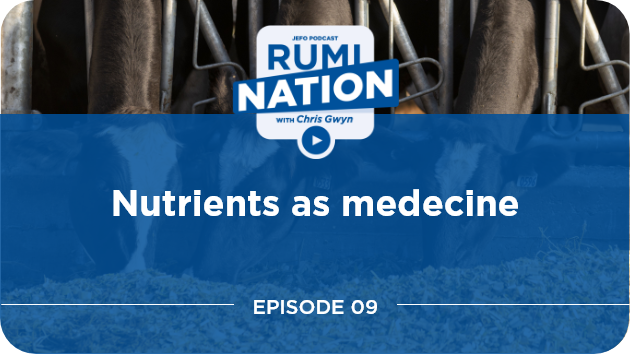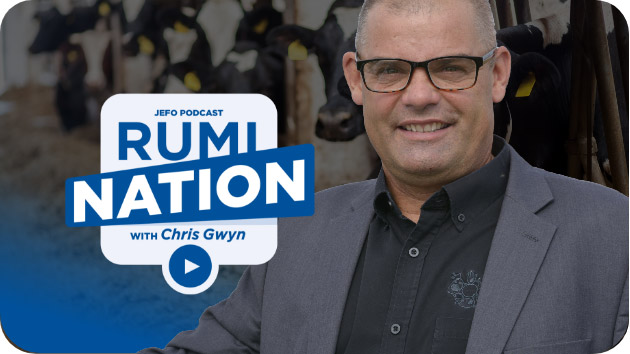RumiNation | S02 : E10
B Vitamins in Ruminants:
Hypotheses, Research & Impacts
Brought to you by Jefo Nutrition
Share now!
Did you enjoy this episode?
Share now!
B Vitamins in Ruminants: Hypotheses, Research & Impacts
What does research say about B vitamins in dairy cows? What are the hypotheses and what are the presumed positive impacts of vitamin supplements in ruminants?
Find out more about the models and current research with Dr. Christiane Girard.
Our guest - Dr. Christiane Girard
Dr. Girard was raised on a dairy farm in Québec, in the Eastern Townships. She has obtained her PhD at Laval University in Quebec City. She then went through postdoctoral training at the National Institute for Research in Dairying (NIRD) in the UK. Upon her return to Canada she worked as a research scientist at the Sherbrooke Research and Development Centre of Agriculture and Agri-Food Canada.
[Learn more about her]

Timestamps & Summary
01:33:00 – Why did you start researching B vitamins, a nutrient that was supposedly useless for the cow? And how did your original hypothesis change over the years?
Dr. Girard started to think about B vitamins when she had to prepare a seminar and a review of literature during her PhD. Pregnant at the time and having to take folic acid supplement herself, she decided to conduct her review on folic acid supplement in mammals. She was surprised that there was really nothing about ruminants, especially in dairy cows.
When she started to work at Agriculture and Agri Food Canada, she first explored dairy calves because it was more acceptable to look at their requirements. They indeed were pre-ruminants just starting to have a functional rumen. But her main interest was dairy cows, since they are pregnant and lactating for much of their life.
Her hypothesis was that if the supply of B vitamins is lower than the needs of the animal, giving a supplement will improve the performance, and the metabolic indicators.
Dr. Girard also explains that her and her team discovered that the period with the largest effect was during the transition and early lactation periods. There is no clear mark as to when exactly, but the largest effect was during the first 100 days of lactation. Also, they discovered that folic acid and B12 vitamins are working together and can’t be separated. Dr. Girard explains why.
9:27:00 – What sorts of effects have you seen at the cow level?
Dr. Girard explains that they saw an increase in milk production and milk component yield. Also, the cows were doing so while consuming the same amount of food, and while losing less body weight. Their metabolism was more efficient.
11:58:00 – You’ve been working on models to predict the exact B vitamin need of the cow. Are we missing out by waiting for models?
The response to the vitamin supplement is currently different among farms and experiments. So right now, we can’t predict the amount available for the dairy cow, and it would be a lot more efficient if we could. That is why Dr. Girard says we need an equation to predict when the supply is likely to be lower than the demand, and in this case, how you can either change the diet composition or use vitamin supplements at the right time.
14:37:00 – What would be the take-home message when it comes to B12 vitamins and folic acid?
Dr. Girard says that for dairy producers, it would be interesting to look at the effect of B vitamin supplement, especially during the transition and early lactation periods. For the researchers, it would be interesting to keep studying B vitamins. We need a lot more research on the topic!






